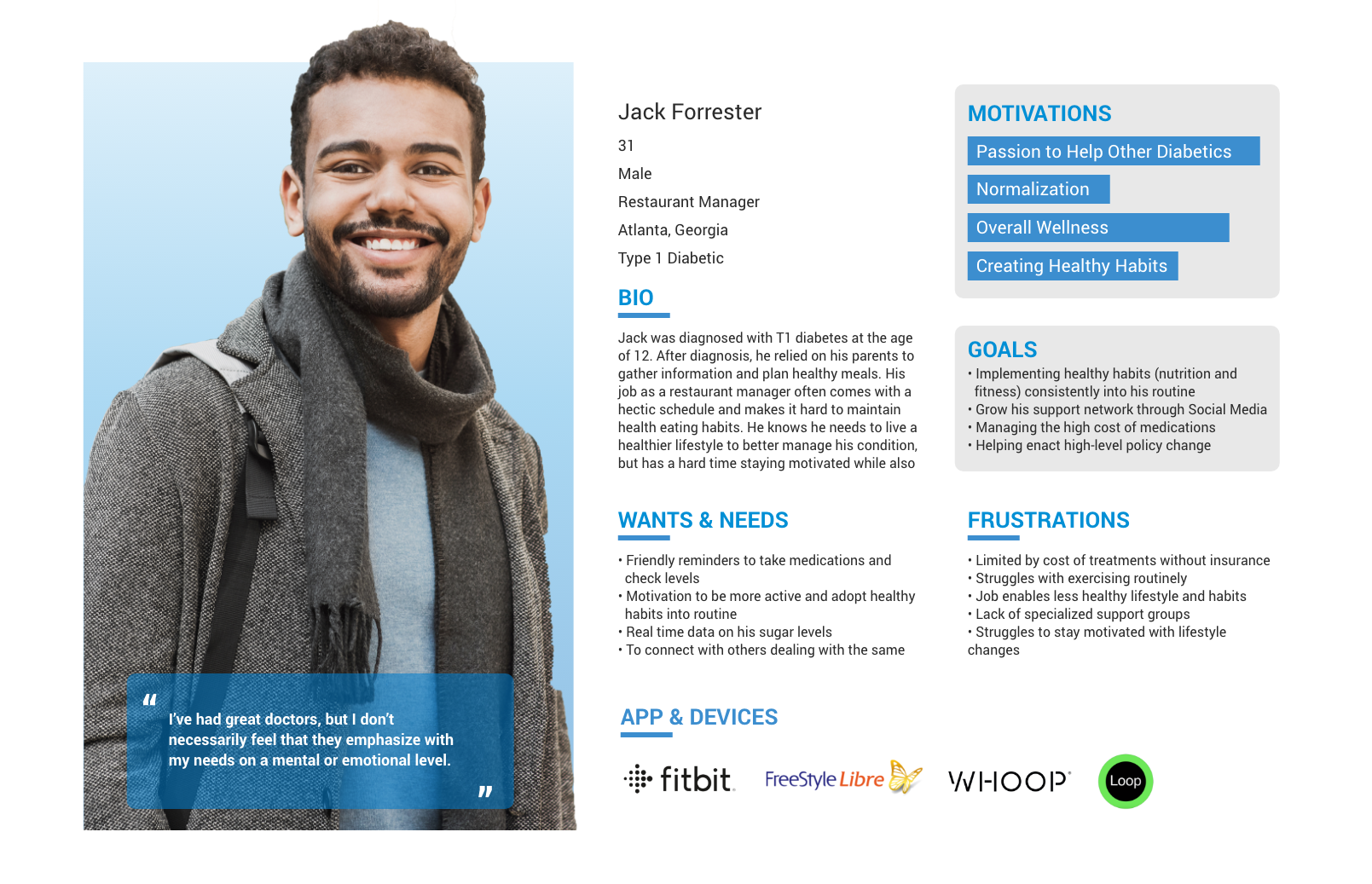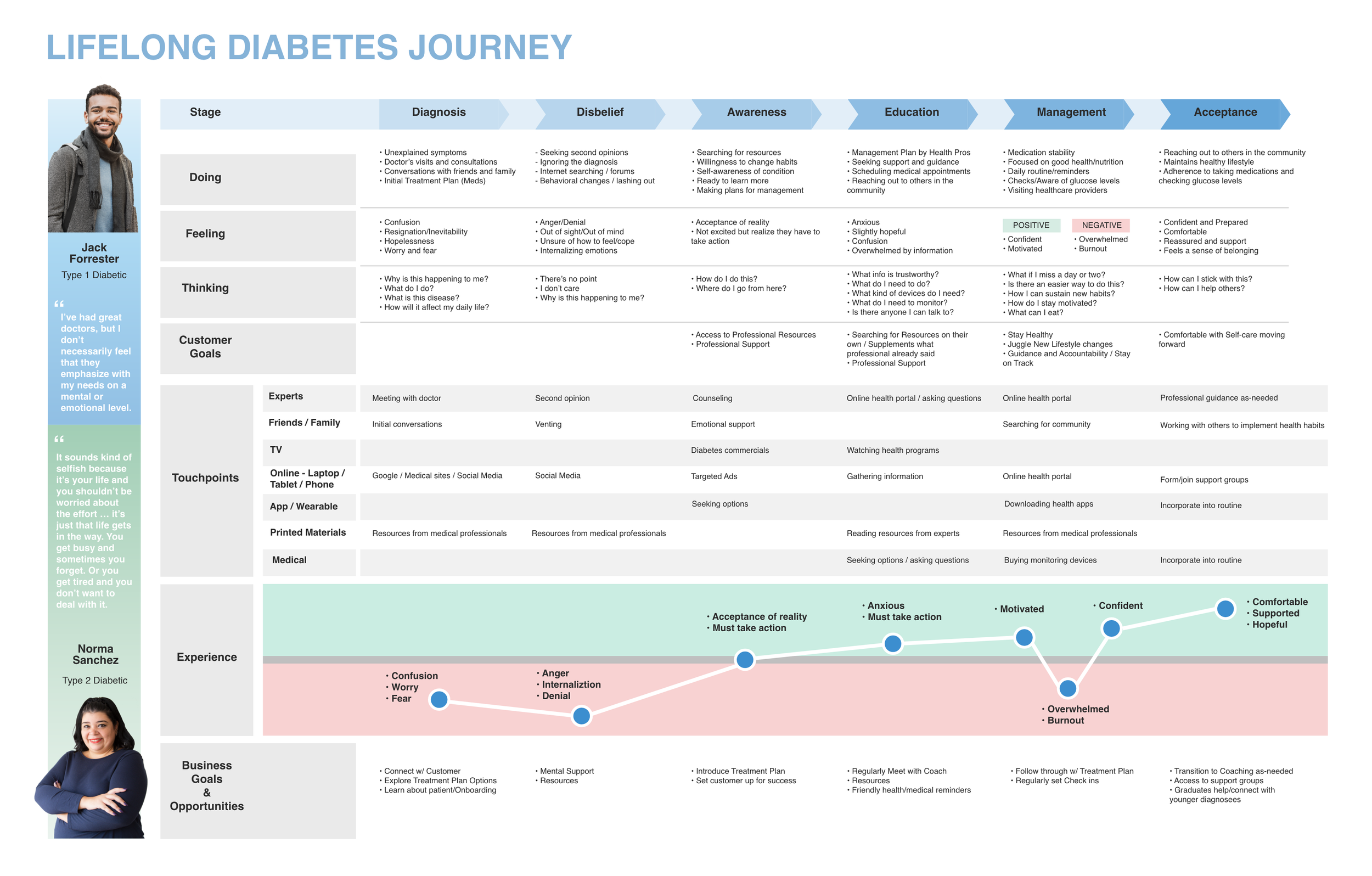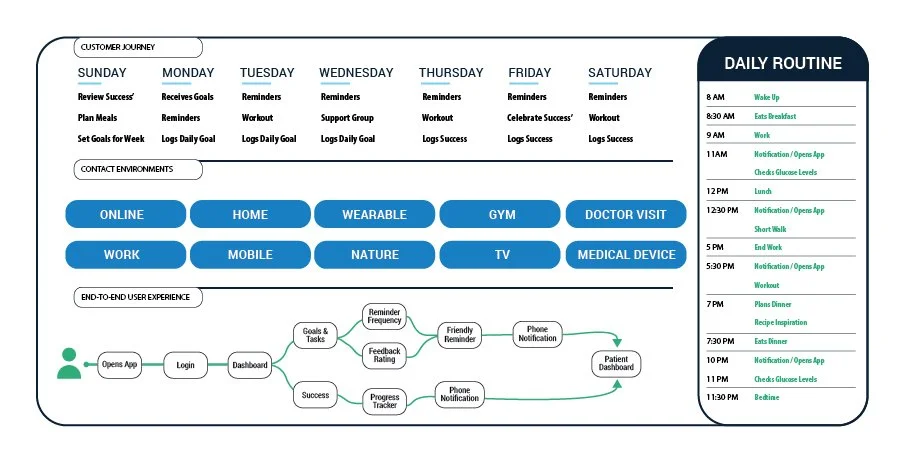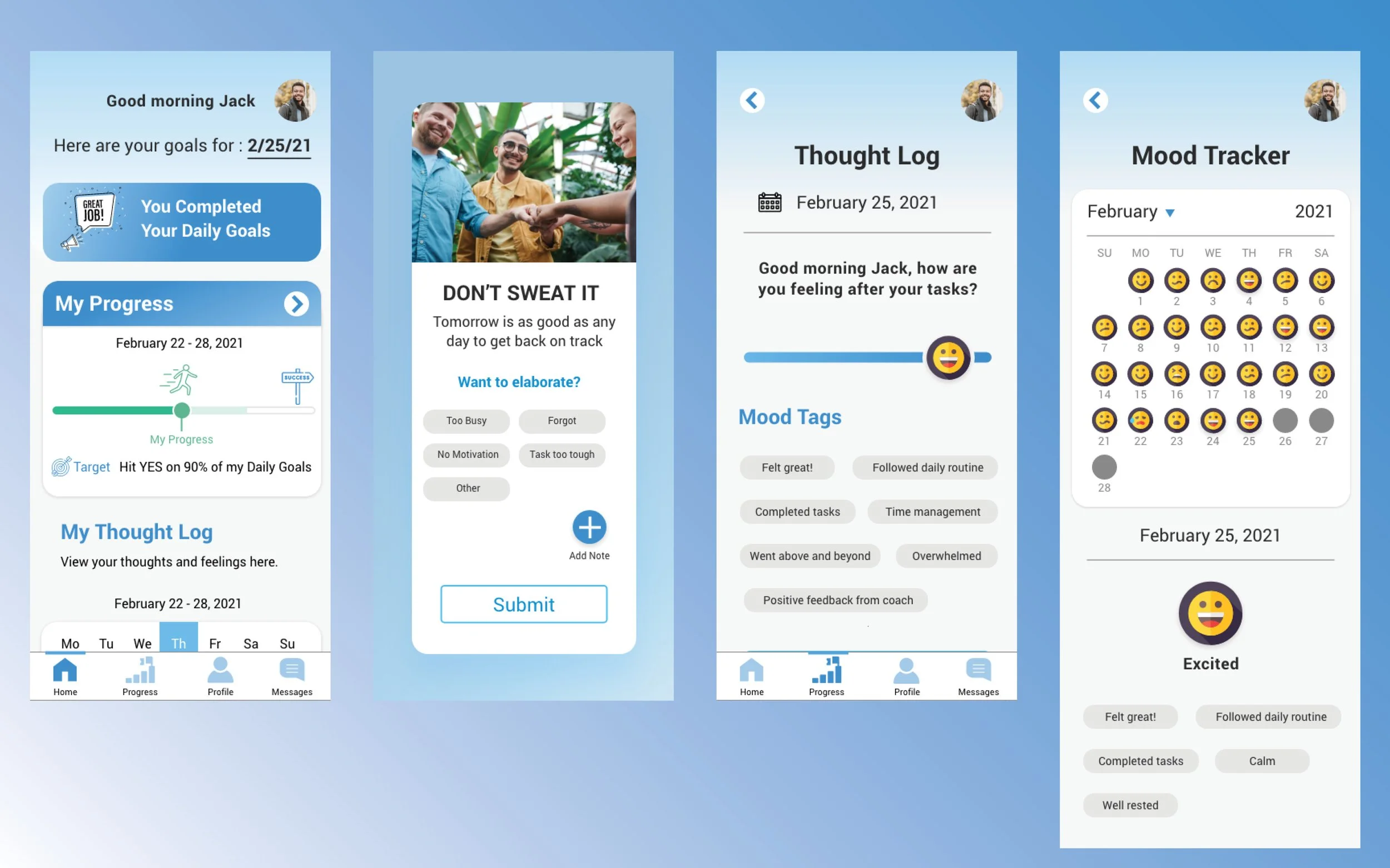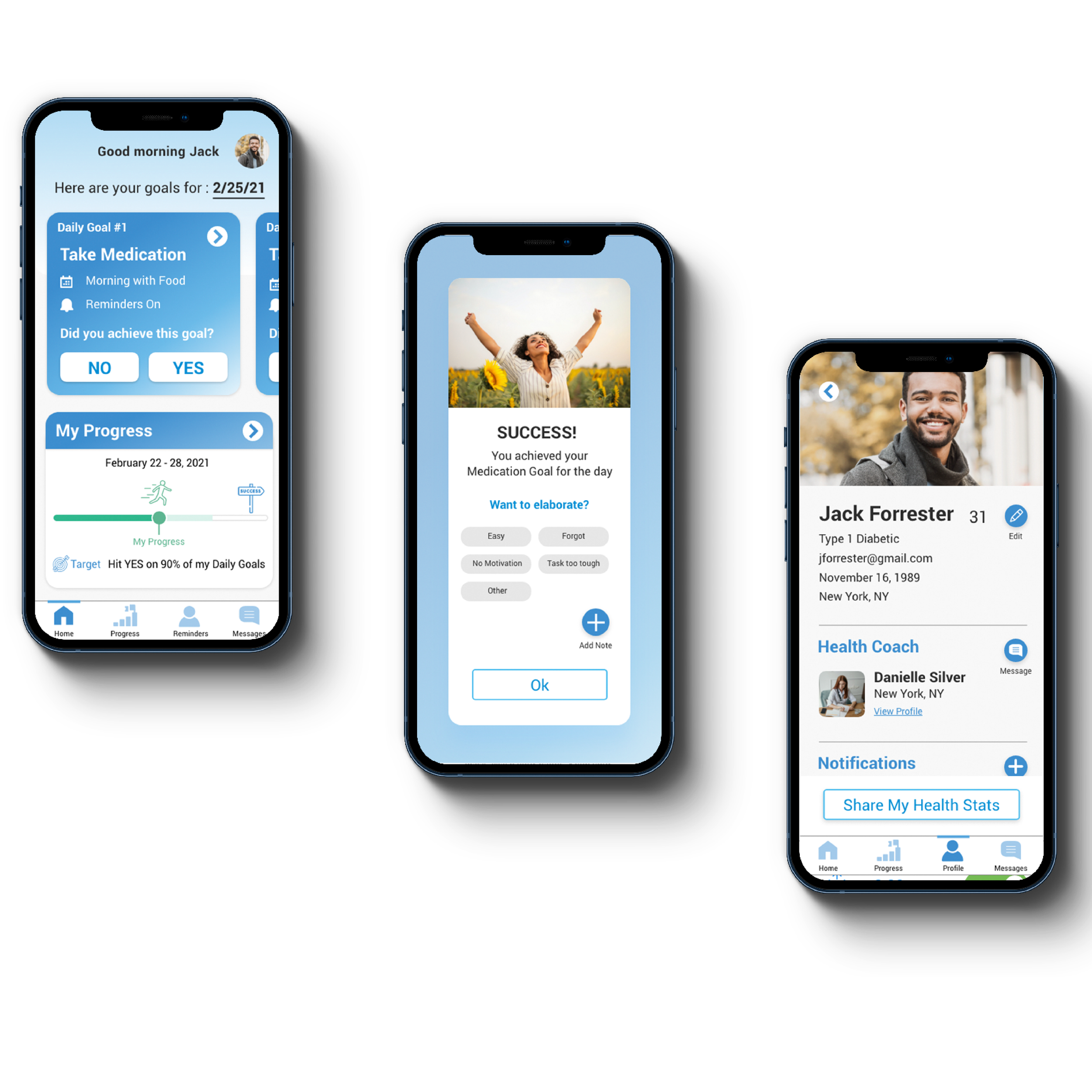Cecelia Health
Who is Cecelia Health?
Cecelia Health is a health and wellness technology company that provides personalized, expert medical coaching services to people managing diabetes and chronic illness. Check them out at www.ceceliahealth.com
Role + Responsibilities
Research / UX / Product Design
Project Year + Duration
1 month - 2021
Team
3 UX Designers, 1 UX Design Lead, 1 Business VP
I was a part of a team with 2 other freelance UX designers and we reported to Cecelia Health’s UX Design Lead.
As a team, we divided up user research tasks such as quantitative research, interviewing targeted users, persona creation, and journey mapping. I was directly responsible for 3 Type 1 Diabetic user interviews, T1 Diabetic persona, and the overall journey map.
Once we received approval to move forward, I was responsible for the visual design and overall high fidelity mockups. Getting to this solution required strategic planning, research, and cross-functional collaboration.
Learn + Understand
Problem /
Diabetes is a lifelong illness and therefore doctors can not cure an acute illness through a few visits. Instead patients must take ownership of their treatment to make the sustained daily changes required for improved outcomes. In recent years, coaching has become a very successful addition to this paradigm in order to guide, motivate, and problem solve along with patients on their journey to sustained management.
“It sounds kind of selfish because it’s your life and you shouldn’t be worried about the effort at all...it’s just that life gets in the way. You get busy and sometimes you forget. Or you get tired and you don’t want to deal with it.”
Solution + Key Insights /
Cecelia Health is looking to help users with Diabetes better understand opportunities to more efficiently utilize the Cecelia health coaching network in order for patients to lead a healthy lifestyle. Ideally, this effort will not only improve user satisfaction but also open up new consumer segment opportunities.
Users expressed personalized plans and coaches would help them succeed with their personal health.
The management ecosystem is massive and no one company is effectively helping all touch points.
The daily routine can be overwhelming and is the hardest part to master as results can be incredibly delayed.
Users want reminders but feel they aren’t provided in an actionable way.
Explore + Define
Research /
We conducted fifteen 1-on-1 interviews in order to document and learn about what’s working/ not working with diabetic users. Our interview script focused on support, tracking, and daily challenges along with personal management techniques. Again HIPPA laws made finding participants quite difficult so we relied on personal networking to build the group of participants. These ranged in ages from late 20’s to late 60’s and represented a good range of Type 1 and Type 2 diabetic users. Each of us individually interviewed five participants over zoom for roughly 30 minutes each.
The pain points generally fell into two meta categories:
Onboarding / Learning
Maintenance / Doing
We also saw a fairly clear pattern that if patients had not witnessed a family member struggle with diabetes it could take many years for them to take the disease seriously.
We synthesized our findings and generated 2 personas broken down into users who had type 1 and users who had type 2 diabetes. This helped explore the specific goals and needs of our two user groups. We gained insight into how each user group specifically navigated through their current products, healthcare team, and day-to-day wellness maintenance . We learned:
The set of devices and services used between personas can be very different.
Both personas find it difficult to become motivated to adopt healthier habits as daily life can easily overcome those goals.
“I’ve had great doctors, but I don’t necessarily feel that they emphasize with my needs on a mental or emotional level.”
Key Insights /
The maintenance side of the pain point affinities included medication, exercise, meal planning and daily tracking.
Users aren't sure how to make large lifestyle changes, like nutrition, in daily habits and need help doing so.
A user’s daily routine can be overwhelming and is the hardest part to master as results can be incredibly delayed.
Users want reminders but feel they aren't always provided in an actionable way and can be overwhelming which can cause confusion and frustration.
Understanding the User Lifecycle /
Users are being overwhelmed with information, devices, care, and health tracking while not seeing the immediate impact of their actions, therefore are prioritizing familiarity and comfort over making big lifestyle changes.
Another challenge in diabetes management is the timescale of the journey for the user. It is a lifelong issue with several stages that can take many years to control. To understand the intricacies of this process and dive into areas where our efforts could create the most impact, we built 2 journey maps: one for the lifetime challenges and one for a weekly/ monthly cycle.
Opportunity areas focused on:
Personalized coaching to instill motivation and good habits.
Connecting positive actions with future results.
Actionable goals to prevent users from being overwhelmed.
Simplifying the data entry process so the users’ care team has access.
Improving insight into daily habits for both patient and coach.
How Might We /
Optimize the self-care process for patients to establish and maintain achievable long-term health goals.
Provide more guided educational resources that do not overwhelm patients.
Create a more streamlined communication process between a user and their care team.
Design + Iterate
Process /
Our team had 1 week for design so we chose to do a modified design sprint, while realizing that we would not have the capacity to test our MVP with diabetes users due to time and HIPPA requirements.
We sketched out a few different app concepts, including:
a guided audio note tool
a food-based tracking system
a guided goals and task tracking tool
a universal tracker app (think Mint),
a gamified tracking and tasks tool
a mindfulness/meditation app tailored specifically for diabetics
We decided to develop the guided goals and task tracking concept based on prior research and dot voting. Importantly this would allow us to help solve our HMW statements as it would create a better dialogue between coach and patient and allow an expert to cut out the noise and better motivate someone to do the small and actionable steps needed to improve their outcomes.
The user goals were then captured in a flow: View daily goals, take action, follow their positive progress, and if needed, share results with their care team. We wanted those steps to be as frictionless as possible.
Our team then took our individual storyboard sketches and refined them. Next, we used dot voting to decide on a final flow for our wires and solutions that we felt best addressed user needs and business goals. Afterwards, I was tasked with creating the final high fidelity mockups for the client.
User-centric Features /
Customized daily goal reminders to stay on track
Success messages for daily affirmation
Progress tracker to help set positive, health habits
Personalized 1o1 coaching to establish long-term success
Evaluate + Advance
Impact /
Despite the absence of concrete metrics, our team contributed valuable research and artifacts that the Cecelia Health team did not have, such as:
Interview guides, demographic and user research, synthesized research notes, and a competitive ecosystem map
Identified and developed a new target audience demographic through interviews and persona creation
Developed detailed journey maps that highlighted key pain point areas of the patient lifecycle where the CH team can dive deeper, test concepts and ideate on new features faster
Created a baseline concept app design and prototype that the CH team can build upon
Outcome /
The final app design allowed for a very easy and friendly level of engagement at first, with controlled notifications to get the user to regularly check their task list. The app allows users to easily check off tasks when they are ready and even obtain more pertinent knowledge if they want. Our next step would have been 1o1 user testing to assess the viability of this concept and MVP.
Challenges /
Gathering pertinent diabetic patients on our own vs having access to Cecelia Health patients.
Working as a team of 3 designers, we butted heads on many things including:
Whether the app should focus on a gamification theme
Key features to prioritize from our research
Visual design direction



